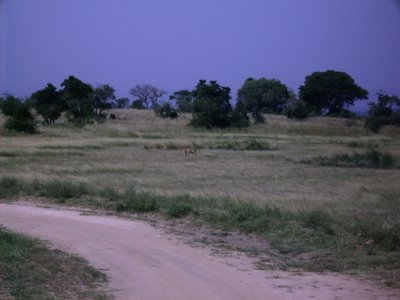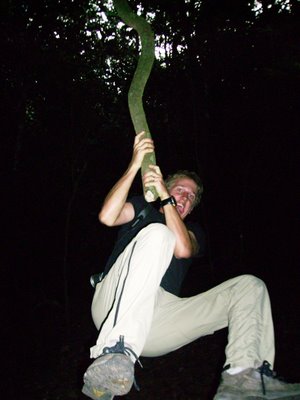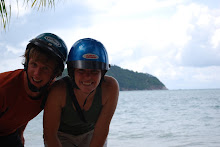
Here we are in another country. We're in Rwanda. We've left the second most densely populated country in the world, and entered the one that tops the list. Since we really haven't writen much lately I'll do my best to convey my impressions of what we've been seeing in this part of the continent.
Everyone's heard of Rwanda. You remember it in the news almost 13 years ago. You've seen the movie, and you know about all the horrific events that took place here. Millions were masacured, millions became refugees, and more still were left as orphans. Things have now stabalized greatly. The goverment is doing a great job, it's peaceful, and tourism is doing very well. NGO's cover the country, because everyone has heard, and everyone wants to help. But who's heard of Burundi? If you're from Cornerstone, or know the Walls then you have. I hadn't either, before our friends moved there to work for MCC.
Burundi lies directly south of Rwanda, and is made up of the same culture and people groups as Rwanda. It's a country that has also seen similar conflicts with enourmous genocides of it's own. I won't pretend to know very much about the details of it all either, since my limited knowledge has only come from the short time that we spent there. But it's certainly a place that has slipped under the radars of all western media and escaped all tourism...
People everywhere. It's the first thing that I notice as we drive though the extremly hilly country. The matatu races through the twisting roads dodging countless locals walking. Mostly women. Mostly with bare feet, and most with a sleeping child slung on her back. She walks through her country looking beautiful. Beautiful, though she is unaware. She wears no makeup. She wears no namebrand clothing. Most don't even have anyhair. But she is beautiful as a woman. She struggles to make her wage, if shes getting paid at all. She stuggles to carry her tired legs up the long steep hills. She stuggles to survive. Yet she walks. She walks with a load. A baby on her back. An enourmous pile of wood or produce on her head. At the very least she carries her hoe with which she will toil all day in the garden.
I notice the bikes. Burundi seems to be a country supplied by bicycle. The young men ride hard carrying enourmous loads of everything you can imagine. They carry long poles of bamboo, or huge pieces of steel standing straight up as high as fifteen feet. They carry bag upon bag of casava or maize flour, or dead sows, with which the country is fed. If they can get it on a bike, they're moving it. They speed down the hills at breakneck speed, and walk as slow as ants going up the other side. Few are fournunate enough to grab onto the back of a slow truck. Yet they carry their loads. I look at them and I smile. They're working. They're working hard. More so than the countless men that sit and chat or smoke as the women walk by with their loads.
I notice the children, barefoot and clothed and in rags. They play. They laugh and cry. They hold their hands out when they see me. They see my white skin and know that I am rich. They yell, "Muzungu", and run after me. Desperate. Desparate for food, desparate for money. Desperate for a life that is better than their own.
I see the people, but I cannot see their hearts. I cannot know the unseen which they also carry. Their history, their horrors; these I have only heard of. Do the women who carry their hoes, also carry with them the visions of the blood that they have seen shed? Do the young men who ride the bikes think of their parents who were murdered before their eyes? I think so. Will the child who plays or begs be a new generation who grows up with parents, unlike the seven youth we played frisbee with who all are orphans? I hope so.
What do I see as we enter into Rwanda? I see trees larger than my legs, which line the roads and cover the hill tops. These have all been cut down in Burundi. I see kilometre after unboken kilometre of cultivated land. As in Burundi everything is grown everywhere. I see fields that are all cultivated by hand. These fields are so steep that it wouldn't be possible to work them with a tractor, not that any are available. (A doctor told Doug, that most of the injuries he treats, are caused from people falling out of their gardens). I also see roads that are smooth
, unlike the pothole riddled streets of Burundi. I see a people hiding under anything they can as the rain pours from the sky and rushes through the ditches (when it rains here it really rains). I see the same people though, doing the same things. People with the same painful history stuggling to move on and survive.
In reality we've seen very little of these two countries and I do not pretend to be an expert. But what we have seen we love! A beautiful lanscape, beautiful culture and beautiful people.
Here's some pictures of everything we've been seeing. Most from our trip to paradise.










 Here's our great Banda! Complete with bugnet and fan!
Here's our great Banda! Complete with bugnet and fan!










 The first animals we saw (giraffes, and elephants) were quite a distance from us and hard to see....there were rumours of a lion as well but we can't claim that we actually saw it. After losing hope a little bit and seeing TONS of warthogs and bush bucks (antelope type animals) we actually saw a lion. We even have a picture to prove it (although it's a little far away).
The first animals we saw (giraffes, and elephants) were quite a distance from us and hard to see....there were rumours of a lion as well but we can't claim that we actually saw it. After losing hope a little bit and seeing TONS of warthogs and bush bucks (antelope type animals) we actually saw a lion. We even have a picture to prove it (although it's a little far away). We watched the lion creep up on some bushbucks and make an attempt at catching one. I thought it gave up pretty easily, but maybe that's because we were watching. Anyway, it was a good intro to the animal world in Africa.
We watched the lion creep up on some bushbucks and make an attempt at catching one. I thought it gave up pretty easily, but maybe that's because we were watching. Anyway, it was a good intro to the animal world in Africa.
 It was a great boat ride. We cruised past hundreds of hippos and dozens of crocodiles all keeping cool in the water or basking in the sun along the shore. (Kaley I think you wanted to see some hippo pictures. We've got lots more to show when we get home!)
It was a great boat ride. We cruised past hundreds of hippos and dozens of crocodiles all keeping cool in the water or basking in the sun along the shore. (Kaley I think you wanted to see some hippo pictures. We've got lots more to show when we get home!) There was some great bird life as well! The climax of the trip was actually seeing the falls though. It is one of the most powerful surges of water in the world. The water of the Nile all spills down through a small 6 metre opening.
There was some great bird life as well! The climax of the trip was actually seeing the falls though. It is one of the most powerful surges of water in the world. The water of the Nile all spills down through a small 6 metre opening. The force of the water traveling through here was incredible. When we reached the falls we got out of the boat and hiked along a trail to the top of the falls. It was great!
The force of the water traveling through here was incredible. When we reached the falls we got out of the boat and hiked along a trail to the top of the falls. It was great!























